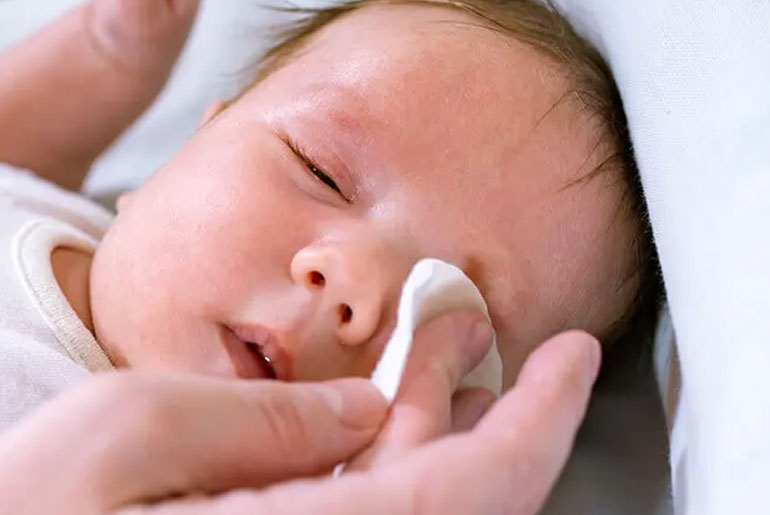During the monsoon season, eye diseases and allergies become more common, making children particularly susceptible. Watery eyes in babies can sometimes indicate more serious eye conditions, which understandably concerns parents. It is important to understand the potential causes behind this symptom to provide the right care and ensure your baby’s comfort and eye health. If watery eyes persist or are accompanied by additional symptoms like fever or unusual discharge, consulting a pediatrician is crucial for proper diagnosis and treatment.
Here’s a detailed look at some potential causes and remedies for watery eyes in babies:
1. Conjunctivitis (Pink Eye)
- Causes: Viral or bacterial infections.
- Symptoms: Redness, swelling, and sticky discharge causing crusting around the eyes.
- Treatment: Antibiotic eye drops or ointment prescribed by a pediatrician to clear the infection.
2. Common Cold
- Causes: Viral infections like the common cold.
- Symptoms: Watery eyes, congestion, and other cold symptoms.
- Treatment: Managing cold symptoms with appropriate pediatric care can help alleviate watery eyes as the cold resolves.
3. Narrow or Blocked Tear Duct
- Causes: Underdeveloped tear ducts that may not fully open until several months after birth.
- Symptoms: Persistent watery eyes.
- Treatment: Gentle massage between the eye and nose can help open the tear duct. Consult a pediatrician for proper technique and further guidance if needed.
4. Nasal Issues
- Causes: Nasal polyps, cysts, or tumors obstructing the nasal passages.
- Symptoms: Excessive tearing and watery eyes.
- Treatment: Consultation with an ear, nose, and throat (ENT) specialist to address underlying nasal issues.
5. Exposure to Allergens
- Causes: Allergies to pollen, pet dander, dust mites, etc.
- Symptoms: Watery eyes, sneezing, itching.
- Treatment: Reducing exposure to allergens and maintaining a clean environment. Allergy medications may be prescribed by a pediatrician.
6. Environmental Factors
- Causes: Irritants such as smoke or dust.
- Symptoms: Temporary watery eyes.
- Treatment: Ensuring a clean and smoke-free environment for the baby can help alleviate symptoms. Use air purifiers and keep the baby away from smoke and other irritants.
General Monsoon Eye Care Tips
Keep the Eyes Clean: Gently wipe your baby’s eyes with a clean, damp cloth to remove discharge.
Maintain Hygiene: Ensure that anyone handling the baby washes their hands frequently to prevent the spread of infections.
Avoid Rubbing Eyes: Teach older children to avoid rubbing their eyes to prevent irritation and infection.
Proper Ventilation: Ensure good ventilation in the house to reduce humidity and mold growth.
Use Clean Linens: Regularly wash bed linens and towels in hot water to remove allergens and bacteria.
Limit Screen Time: Reduce exposure to screens to avoid eye strain.
Protect from Rainwater: Keep children indoors during heavy rains to prevent exposure to dirty rainwater which can carry pollutants and pathogens.
Regular Check-ups: Schedule regular eye check-ups with a pediatrician or an eye specialist to monitor and maintain eye health.
Balanced Diet: Ensure your child’s diet includes foods rich in vitamins A and C, which are essential for eye health.
Use Prescribed Medications: Only use medications prescribed by a healthcare provider and avoid over-the-counter eye drops unless recommended by a doctor.
Understanding these causes and treatments can help parents effectively manage watery eyes in their babies, ensuring their comfort and eye health during the monsoon season.
If your baby’s watery eyes persist or are accompanied by other symptoms such as fever, irritability, or unusual eye discharge, it’s crucial to consult a pediatrician promptly. This ensures a proper diagnosis and the development of an appropriate treatment plan.
Disclaimer:
The information contained in this article is for educational and informational purposes only and is not intended as a health advice. We would ask you to consult a qualified professional or medical expert to gain additional knowledge before you choose to consume any product or perform any exercise.








